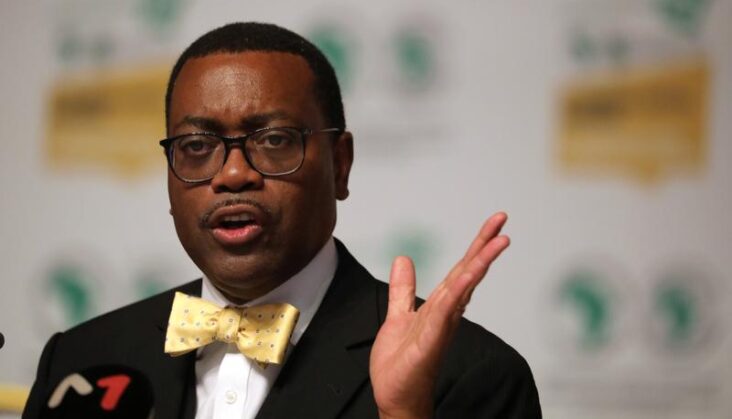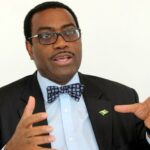Against the backdrop of the weaponisation of race and colour by Donald Triumph administration with poor suspected African Americans being whimsically gunned down on flimsy suspicions by the police (remember!), the deserved re-election of Dr Adesina to serve a second five-year term as President of the African Development Bank Group on Thursday, August 27, 2020 is refreshingly uplifting for all Africans.
This singular smooth transition at ADB changes the recent stories of despair about Afro-pessimism into Afro-optimism. We can for once “breath” ( the singular inalienable right, George Floyd was denied !) that the good work of good Africans on African soil counts as much as their lives must matter everywhere including United States of America. It’s remarkable that contrary to dubious received wisdom which says Africa lacks institutions, African institutions like AFDB have indeed come of age working for the benefits of the continent.
The election result, which gave Adewunmi a hundred percent of votes of all regional and non-regional members of the bank, was announced by the Chairperson of the Board of Governors of the Bank, Mrs. Niale Kaba, Minister of National Planning of Côte d’Ivoire. This shows that when Africans resolve to work together, we can reject divide and misrule of the past colonial masters. In Dr. Akinwumi A. Adesina’s re-election bid, there is no “Anglophone” or “Francophone” but Pan-Africanism. He was first elected as the President of the Bank on May 28, 2015. He has since been globally acknowledged to be a success story. The renowned development economist and a World Food Prize Laureate and Sunhak Peace Prize Laureate, Dr. Adesina, had “ distinguished himself in driving a bold agenda to reform the bank and accelerate Africa’s development”.
However, not with Donald Trumph’s United States. America is a non-African country with 6.5 percent of the shares in the bank but nonetheless spearheaded a smear campaign against Adesina on the eve of the expiration of his first term. There was an emergency bagful of accountability, due process and human resource allegations against the management of the bank under Mr. Akinwunmi Adesina. Notwithstanding the clean bill of health given to Mr Adesina by the board of directors of the bank, America still insisted on a further probe. Coming on the eve of the re-election bid of Mr Adesina, it was self evident that America wanted him out of the bank, not on substance but mere subterfuge as part of the rivalry with China in Africa.
It was commendable that all African shareholders made up of all the heads of state and governments of ECOWAS region endorsed him for a second term despite America’s divisive strategy. The point cannot be overstated: African Development Bank Group (AfDB) or Banque Africaine de Développement as the financial provider to African government development projects in the regional member countries (RMC), has the primary mandate of financing development and eradicating poverty on the continent. Founded in 1964, AfDB remains a successful pan-African multilateral development finance institution. After centuries of slavery and colonialism, the founding fathers (and mothers!) of the newly independent (23) twenty-three African nations initiated two draft charters.
One sanctions the establishment of Organisation of Africa Unity (OAU) in 1963 and the other regional development bank, African Development Bank (AfDB), formed a year later, precisely in August 1964, in Khartoum, Sudan. Headquartered in Abidjan, Cote d’ Ivoire, it has financed 2,885 operations, for a total of $47.5 billion. It consistently receives an AAA rating from the major financial rating agencies. Nigeria is the AfDB’s largest shareholder, with a little over 9% of its total capital. The objective of the African Development Bank (AfDB) Group is to spur sustainable economic development and social progress in its regional member countries (RMCs), thus contributing to poverty reduction. Adesina is the first Nigerian to hold the post. He had a remarkable carrier like other successful Africans who we must celebrate if we have to change the narrative of the continent from victimhood to prosperity. It is open knowledge that during his tenure as Minister of Agriculture, he reformed the agricultural system by introducing more transparency into the fertilizer supply chain and bringing up innovative ideas such as giving farmers mobile phones.
As a result, 14.5 million farmers benefited within the first years of its implementation. He also attracted $5.6 billion in private sector investment commitments in Nigerian commercial farming. Certainly, Africa still suffers from huge financial deficits to meet its enormous development challenges. However, there is no doubt that under the current re-elected activist bank leadership, the bank would mobilise scarce resources for investment and offer policy advice and technical assistance to support development efforts. Through the Africa Investment Forum, the AfDB in 2018 and 2019 attracted more than $80 billion in infrastructure investment interests. This has rightly refocused the African perspective from Aid dependency to domestic investment. Notwithstanding the resistance from abroad especially the United States, the bank spearheads an increase of its shareholder general capital from $93 billion to $208 billion.
Many bear witnesses that Adesina is passionate about value addition and beneficiation to the abundant Africa’s agricultural raw materials in particular. He actually said ADB presidency is not a job for him but a call to serve the continent. Certainly the multiple award winning president of the bank is an asset to the bank and Africa. Underpinning Africa’s economic growth, prospect is the importance of beneficiation and diversification. National governments need to dispense with the false narrative that has encouraged a “from the ground to the market” rent seeking economic trade with the global north and begin a policy reorientation that focuses on beneficiation and diversification.
A focused regional financial provider like ADB is better positioned to push for this agenda of value addition that would create decent jobs for African youths.The overriding objective of the AfDB is to improve living conditions on the continent through various initiatives. The pan-African institution should maintain an African character as it is derived from African geography and ownership structure. The capacity of the bank should be strengthened at this critical times of direct threats to lives and livelihoods in Africa due to the pandemic.
Two largest African economies have been negatively impacted by COVID -19 namely Nigeria: 54, 247 cases/1023 deaths, South Africa: 688,000 cases/ 14,263deaths. It is commendable that under Adesina’s leadership, the African Development Bank’s Board of Directors approved a $10 billion facility to support African countries to address the COVID-19 pandemic. The bank launched a $3 billion COVID-19 social bond on the global capital markets, “the highest US dollar denominated social bond ever in world history, which is listed on the London Stock Exchange, Luxembourg Stock Exchange and NASDAQ.”
In the coming years, the bank must deepen partnerships even more with organised labour, civil society as well as businesses. With the disruptions of global supply chain, AFDB must rise to promote agricultural and industrial revolution in the continent. Global resources must be allocated for real economy rather than bailing out financial institutions. All financial institutions including AFDB must place employment and decent work at the centre of macro-economic policies alongside emergency debt relief to enable developing countries to combat the COVID-19 pandemic and facilitate a sustainable recovery from the crisis.

 Join Daily Trust WhatsApp Community For Quick Access To News and Happenings Around You.
Join Daily Trust WhatsApp Community For Quick Access To News and Happenings Around You.


